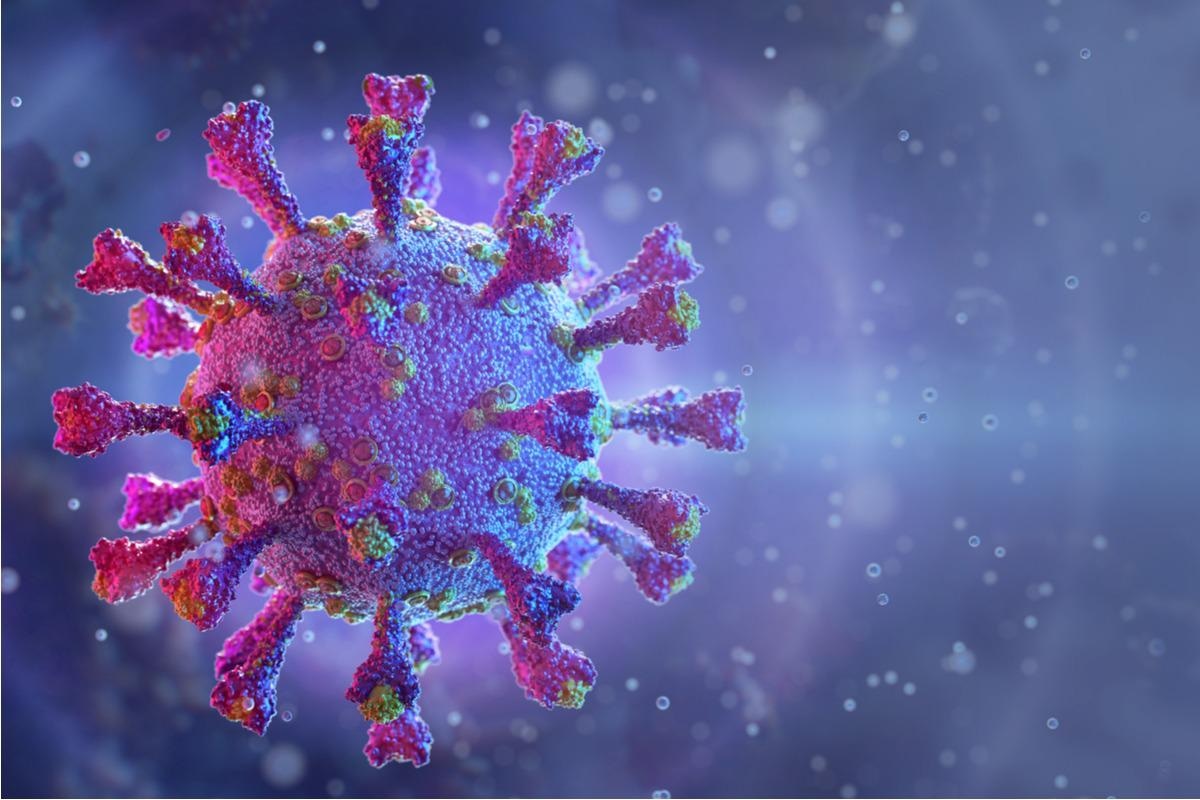A study posted recently to the Research Square* preprint server and under consideration at a Nature Portfolio Journal suggested the inhibition of TANK-binding kinase (TBK1) and its homolog, IκB kinase-ε (IKKε), could decrease the severity of coronavirus disease 2019 (COVID-19).
 Study: Pharmacological inhibition of TBK1/IKKε blunts COVID-19 immunopathology. Image Credit: Corona Borealis Studio/Shutterstock
Study: Pharmacological inhibition of TBK1/IKKε blunts COVID-19 immunopathology. Image Credit: Corona Borealis Studio/Shutterstock
TBK1 is a critical component involved in various signaling pathways like pattern recognition receptor (PRR) pathways, cyclic GMP-AMP synthase (cGAS)-stimulator of interferon genes (STING) pathway, etc. The kinase activity of TBK1 on STING and others like mitochondrial antiviral-signaling protein (MAVS) etc., leads to activation of interferon (IFN) regulatory factor 3 (IRF3) inducing type I IFNs (IFN-β) that have antiviral activities, including against severe acute respiratory syndrome coronavirus-2 (SARS-CoV-2). Although activation of IRF3 and IFNs is associated with immune responses, excessive IRF3 activation has been implicated in auto-immune disorders like the Aicardi–Goutières syndrome.

 *Important notice: Research Square publishes preliminary scientific reports that are not peer-reviewed and, therefore, should not be regarded as conclusive, guide clinical practice/health-related behavior, or treated as established information.
*Important notice: Research Square publishes preliminary scientific reports that are not peer-reviewed and, therefore, should not be regarded as conclusive, guide clinical practice/health-related behavior, or treated as established information.
TBK1 is activated when its serine (S172) is phosphorylated upon interacting with STING (TBK1-STING complex). According to some reports, the inhibition of TBK1 activity could lower the inflammation in auto-immune disorders. Small molecule inhibitors of TBK1 are known to block its kinase activity, but the TBK1 activation is unaffected. TBK1 and IKKε control the nuclear factor (NF)-κB transcriptional program mediated by STING, and as per some reports, NF-κB activated by TBK1/IKKε could lead to STING-induced inflammation.
The study
In the present study, researchers discovered that idronoxil (IDX), a small molecule inhibitor, can prevent TBK1/IKKε signaling. They assessed the therapeutic action of TBK1/IKKε inhibition in decreasing the hyper-inflammation observed in severe COVID-19 and investigated the effects of IDX in a lethal COVID-19 mouse model. The K18-hACE2 mice were inoculated intranasally with 103 plaque-forming units (PFU) of SARS-CoV-2 Wuhan isolate. IDX administration began on the third day after infection through the fifth day, and the mice were euthanized on the sixth day post-infection.
Results
The authors found that IDX could inhibit STING signaling in human and mouse cells with exceptional potency. A direct interaction between STING and IDX was not observed, and therefore, IDX functions downstream of the STING pathway were investigated. The researchers assessed the effects of IDX on IFN-β-Luciferase reporter activity controlled by the over-expression of IKKε or TBK1. They noted potent inhibition in IFN-β-Luciferase activity with a slightly higher impact on IKKε signaling.
Unlike other small molecule inhibitors, IDX did not block the kinase activity of TBK1/IKKε, suggesting that the action of IDX on TBK1/IKKε could have a different mechanism of inhibition. Interaction of TBK1 dimers with the C-terminus of STING is essential for activating TBK1 to phosphorylate STING and subsequently, IRF3; in silico modeling suggested that IDX binds to the groove between two units of TBK1 dimer, implying that STING C-terminus interactions with TBK1 are hampered due to IDX.
IFNs are protective during a SARS-CoV-2 infection but delayed or sustained production of IFNs has been speculated to cause hyper inflammation observed in severe COVID-19 cases. The authors injected solubilized form of IDX in mice intraperitoneally (i.p.). They noted that the drug was cleared from circulation by 12 hours but was retained in a dose-dependent manner in the lungs. K18-hACE2 mice expressing human angiotensin-converting enzyme-2 (hACE2) were infected with SARS-CoV-2 and i.p. injected daily with solubilized IDX three days post-infection.
IDX administration was associated with significantly less weight loss than control mice. Examination of bronchoalveolar lavage (BAL) fluid revealed lower numbers of neutrophils and lymphocytes in IDX-treated mice, but total leucocyte and macrophage levels remained unaffected in them. Histological analyses of lungs revealed that the inflammatory score and collagen deposition in the respiratory tract was significantly lower in IDX-treated mice than controls indicating reduced pulmonary inflammation due to the protective effect of IDX.
Conclusions
The study demonstrated the prevention of TBK1/IKKε activation by blocking S172 phosphorylation with IDX. It showed that pharmacological inhibition of TBK1/IKKε activity could impede the pro-inflammatory signaling pathways suggesting that the TBK1 signal pathway is crucial to hyper-inflammation in experimental COVID-19.
Moreover, the researchers revealed the application of IDX in 38 human patients with moderate COVID-19 disease in a separate preliminary phase I trial. They suggested that the preliminary clinical study results were encouraging as the subjects demonstrated good tolerability. In conclusion, IDX could be a promising therapeutic molecule useful for treatment against SARS-CoV-2.

 *Important notice: Research Square publishes preliminary scientific reports that are not peer-reviewed and, therefore, should not be regarded as conclusive, guide clinical practice/health-related behavior, or treated as established information.
*Important notice: Research Square publishes preliminary scientific reports that are not peer-reviewed and, therefore, should not be regarded as conclusive, guide clinical practice/health-related behavior, or treated as established information.